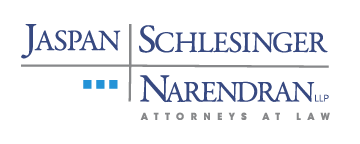Here to help lessen your property tax burden.
For commercial property owners who feel they’ve been subject to unfairly high real property taxation, consulting with a tax certiorari attorney is the most effective way to obtain relief. Jaspan Schlesinger Narendran LLP’s tax certiorari and condemnation law group provides the specialized knowledge and expertise offered by boutique practices, but with the sophistication and resources of a large, premier firm. Residential property owners equally benefit from the breadth of our services in securing lower and fairer property tax bills.
One advantage of our full-service firm’s robust size is the sheer number of specialists who work within many different disciplines. With in-house practice groups in land use and zoning and litigation, we can develop an all-inclusive strategy that addresses multiple issues to help your cause.
Maximizing Financial Returns for Property Owners and Tenants
Based out of the firm’s offices in Garden City and Tarrytown, NY, Jaspan Schlesinger Narendran LLP’s tax certiorari attorneys serve clients throughout Long Island, New York City, and the Lower Hudson Valley. On your behalf, we will aggressively pursue your interests in each stage of administrative proceedings, arbitration, or litigation concerning tax assessment review or eminent domain proceedings.
We Fight for a Fair Valuation for Your Property
Our firm has established and experienced tax certiorari attorneys eager to provide private and municipal clients with the same high level of service we’ve provided throughout our firm’s 75-year history. Our focus on real estate valuation litigation comprises a wide range of competencies, including:
- Commercial tax certiorari proceedings
- Office
- Industrial
- Warehouse
- Retail
- Restaurant
- Condominiums and cooperatives
- Apartment buildings
- Vacant land
- Mixed-use buildings
- Farms
- Converted residences
- Eminent domain proceedings
- Commercial and residential compensation claims
- Commercial fixture claims
- Real property tax exemptions, valuation litigation, and arbitration
- Not-for-profits
- New construction
- Religious
- Educational
- Agricultural assessments
- Commercial horse-boarding operations
- Farms
- Wineries
- Nurseries
- Municipal property tax-related litigation and condemnation proceedings
- Residential tax certiorari proceedings




